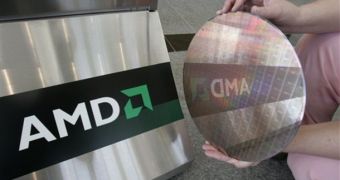As most of us already know, Intel is currently the worldwide leading manufacturer of computer processing cores, surpassing competitor AMD in a number of market segments. Although AMD's graphics subsidiary, ATI, is claiming back lost ground on the market of graphics cards with the release of its latest Radeon HD 4000-series chips, AMD's CPU business is far from posing any threat to Intel's leading position. As a matter of fact, according to IDC, in Q2 2008, the Sunnyvale-based company has lost unit market share to Intel, despite the launch of the triple-core chips and low-power quad-core products.
As an IDC report reveals, the worldwide PC microprocessor shipments for the second calendar quarter of 2008 reached record levels, despite the slow economy and the fact that Q2 is usually one of the slowest quarters of the year. Worldwide processor unit shipments increased 3.1% quarter over quarter, and 16.1% year over year. However, due to strong vendor price competition in the middle and low-end of the desktop PC processor and mobile PC processor market segments, the overall market revenue declined to 4.5% quarter over quarter, to $7.7 billion.
"While sequential market growth is unusual in the second quarter of the calendar year, it's clear that, in Q2 2008, Intel's processor shipments drove the growth. Intel's processor shipments alone grew nearly 4.3% over the first quarter and 20.8% year over year, while AMD's processor shipments were about flat," said Program Director, Computing, Networking, and Storage Semiconductors, Shane Rau.
As also noted in several of our previous articles, one of the main reasons for Intel's successful Q2 results was the release of the company's small-sized, low-power Atom processor, which is featured in most of today's netbooks.
IDC forecasts that the PC CPU market revenue will increase another 7.5% in 2008, to more than $32.8 billion.
"While processor unit shipments exceeded our forecast in Q2 2008, Intel's aggressive approach to the market, through both product and pricing, point to a major, supply-side variable. However, economic concerns cause us to maintain our conservative outlook for the second half of the year," said Mr. Rau.

 14 DAY TRIAL //
14 DAY TRIAL //